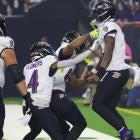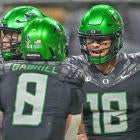
Sterling is on the slide... and we're not talking about the Chelsea forward's indifferent form with England during the international break. The British pound has seen its value slip significantly in recent days, briefly reaching its all time lowest level against the US dollar before rallying off its lows. The ructions of chancellor Kwasi Kwarteng's mini-budget, the announcement of the new government's changes to economic policy, are being felt across the economy. In the case of the country's national sport, the events of recent days may merely serve to accelerate a trend that had long since been established. The sporting gold rush that is American money flying towards English football may only just have begun.
Understanding what this means for football means at least working through the basics of what Kwarteng's "fiscal event" on Friday caused. There was a swift backlash from financial markets. Sterling plummeted after the chancellor committed to tax cuts at a time of rising inflation. In response, the Bank of England attempted to cool the immediate panic in the market by committing to a £65bn package to buy back government bonds, though that left the pound still hovering at only a little over a dollar. In addition the bank seems bound to raise interest rates to cool the impact of Kwarteng's tax cuts for top earners, a move that would have a sizeable impact on the nation's homeowners, while also seemingly putting the central bank at cross purposes with the government. In technical terms, things are a great big giant mess.
Economic uncertainty won't hurt the Premier League
The UK economy may be on a crisis footing, but as the pound slides so opportunities become available for foreign investment including in that great bastion of British soft power, the Premier League. Joe Ravitch, the banker who helped Roman Abramovich complete his breakneck sale of Chelsea earlier this year, offered a bullish assessment of the game's state earlier this week. "No one is suffering because of the decline of the pound when it comes to English football," the co-founder of Raine Group said at the Forbes Global CEO Conference.
The travails of the British economy will not, Ravitch said, prompt a rush from investors to cash out of the UK football market. Indeed, his recent experience suggests to him that the English game remains a tempting prospect. "Regardless of currency those are huge opportunities," he said. "Based on the diverse and broad scope of the buyers we had for Chelsea, I think that's proven out."
Manchester United face unique challenges
The collapsing value of sterling does bring some complications to the UK game, including at Manchester United, who saw the sterling value of their debt increase from from £419.5 million to £514.9 million in the 12 months up to the end of June, something which they partially credited to the worsening standing of the pound against the dollar. In that aspect the balance sheet will only have taken a less appealing look for United, who have traded on the New York Stock Exchange for more than a decade.
United have publicly indicated their desire to redevelop Old Trafford, should those plans come to fruition than the debt burden on the club will grow significantly, though in the process it would presumably give the club an asset from which they could significantly increase their revenue. "It's a challenge for clubs that have dollar-based debts," says Kieran Maguire, the expert behind the Price of Football podcast, book and website.
But United's circumstances are unique. There are factors that are more universal, for instance that there are outstanding transfer fees to be paid, often in Euros. The pound's decline against its European counterpart has not been as profound as the dollar; indeed the Euro actually fell below the $1 mark at the start of the month after Russia said it would cut off its main gas pipeline to the continent.
Some clubs will need to find a few more pounds in their wallet to pay off transfer debt in Euros than they might have done otherwise but even then the impact is not as profound as one might assume; the biggest teams who pay the most sizeable fees hedge against the value of currency fluctuations.
Increased chance of American Investment
Where the impact of the sliding pound may be most profoundly felt is on money coming into the English game from the US in particular. The reasons to move now were captured by the New York Times' Tariq Panja. In May, the Clearlake-Todd Boehly consortium secured Chelsea for a dollar price of $3.15 billion. The same deal conducted on Monday, Panja noted, would have set the Blues' new owners back $2.68 billion.
UK assets now available at major discount for those with dollars. Football clubs not already owned by Americans among them. In dollar terms for example, Chelsea would have sold for $2.68bn at today’s price rather than $3.15bn back in May. Quite a significant difference.
— tariq panja (@tariqpanja) September 26, 2022
Whether you're after Yorkshire tea, Barbour jackets or Premier League clubs, it is a good time to be a foreigner doing your shopping in England. "The overall impact of sterling over the last five years is quite spectacular," notes Maguire. "Today I'm looking at one dollar equals £0.94 compared to five years ago when it was about £0.77. It has made UK-based acquisitions a lot cheaper."
Jordan Gardner, an American sports executive who has invested in several football clubs including Championship side Swansea City, concurs. "There's no doubt it's more attractive. The US dollar goes further in any investments, whether it's buying clubs, infusing capital, infrastructure, equity or debt.
"It will take time but certainly over the next couple of months you will see this financial climate push deals to the finish line. I'm sure that's going to happen. I think you're probably going to see more institutional type investors looking at it as well. Most investors I talk to want deals, they don't just want to throw money at something.
"At some point presumably the pound will recover, at that time the people who got in now will feel pretty good about themselves."
Premier League a good deal at a great price for American owners
Of course this is no overnight phenomenon. The Glazer family at Manchester United, the Kroenkes at Arsenal and Fenway Sports Group at Anfield have been ensconced in the Premier League for some time. But there has been rapid expansion in recent years, from the billions spent by the consortium that won the race to secure Chelsea to the Ryan Reynolds-Rob McElhenney tandem that saw the opportunity for content in the purchase of National League side Wrexham. If a consortium led by Vegas Golden Knights owner Bill Foley is successful in its pursuit of Bournemouth, then more than half of Premier League clubs would have American shareholders.
Their number could still grow. Gardner, who views his stake in Swansea as a "long-term play", believes that institutional investors such as CVC, who have previously looked at larger scale transactions at a league level, may also look to make the most of the strength that their sizeable capital in dollars offers them, perhaps even with more "micro-transactions" at a club level. These could include infrastructure projects as well as direct investment in a team. Maguire suggests that struggling Leicester and Wolverhampton Wanderers, purchased by Chinese conglomerate Fosun before Beijing rowed back on its plan to make the country a footballing superpower, could be up for grabs in the future.
Even without the favorable position of the dollar on the continent, it is no surprise that US soccer investors have been looking beyond their own borders. On Wednesday, Sportico put the average value of an MLS franchise at $582 million. LAFC, the league's most valuable club, were priced at nearly $1 billion; their revenue for 2021 was $71 million.
"The valuations on assets in North American sports beyond just soccer are so exorbitant," notes Gardner. "A Championship club could go at anywhere from £30-40 million to up to £100 million if it has Premier League infrastructure. That's a fraction of what we're talking about versus MLS. The moment a club goes up to the Premier League you're probably talking about it being worth two to three times more than that.
"The bottom line is you can get in the Premier League for a third to half of the cost of getting into MLS. There you're getting $5-10 million in TV money. In the Premier League you're getting a £100 million."
The likes of Boehly believe that there is plenty more juice to be squeezed from the fruits of the Premier League. In suggesting that Chelsea's value could double in the next five years, Ravitch pointed to non-fungible tokens, business to business data and markets in Asia as untapped resources. For Maguire another revenue source lies in east London, where a Swedish pop group are giving their fans a chance to experience them in their 1970s pomp through holographic avatars.
"American investors are very bullish with regards to the metaverse and bringing augmented reality either to the home or, having been to the ABBA avatar show [something similar] to that. If that is the technology in 2022 what will it be like in 2030?
"It is potentially feasible to have 12,000 seater indoor arenas in New York, Boston and San Francisco all showing Premier League matches in some form of 3D representation, effectively being beamed from Old Trafford and Anfield to events that people are prepared to pay far more than they would do in respect of watching the match on television. It becomes an event.
"When you crunch those numbers and factor them in the Premier League must still look like a bargain. If you charge $30-40 a ticket and that's happening in six cities in the States, six cities in China, a few more in Africa and Australia and then the rest of the Asian market. All of a sudden you've got a million people prepared to 'watch the match'. Manchester United on a good day will make £5 million from a home fixture. That £5 million becomes £30 or 40 million."
If that vision can become a reality then suddenly the fluctuations of the British currency and economy do not seem like quite such a cause for concern. Whatever the state of the pound, American investors see huge growth potential in the Premier League. Right now they can get a slice of the action at a knockdown rate.
















